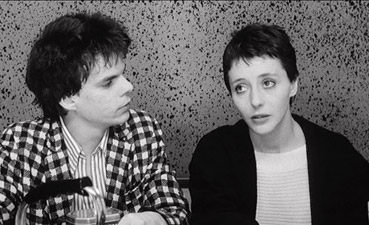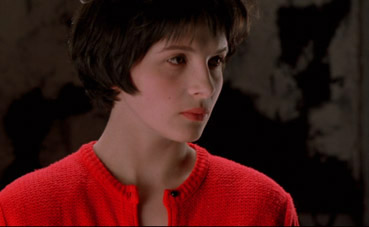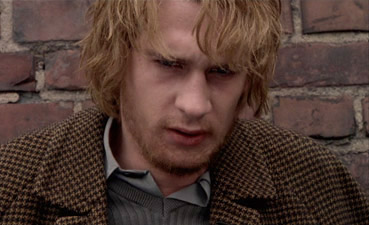|
Mention
the name Leos Carax, even in European cineaste circles, and
you're likely to encounter distinctly mixed reactions. He
made is first feature film in 1984 when he was just 24 years
old and has been acclaimed in some quarters as a genius, despite having only three more movies since. Maybe a genius needs
time to create just the right project. Yeah, sure, that
must be it. Actually, that whole thing of hailing any filmmaker
as a genius cuts no slack with me. It's an overused term
too quickly thrown at anyone whose name is attached to something that
catches critical fire, and if you're daft enough to stick such a label on a 24-year-old first-timer then there's a real danger they might start to believe it themselves. I'm not
saying that's the case with Leos Carax, mind you, but it's
something to be both aware and wary of.

As some will doubtless know, Leos
Carax is not this filmmaker's real name. He was born Alexandre Dupont but chose the
nom-de-plume Leos Carax, apparently in slightly comic reference
to the American Academy Awards (Le Oscar à X – the
Oscar goes to X). Right. Carax
started his career making short films and writing film criticism
before making his first feature Boy
Meets Girl in 1984, which was critically well
received and nominated for César Award for Best First
Work the following year. It's a film that effectively established
would could be called the Carax style, his recurring themes
of troubled and sometimes unrequited love and the problematic
nature of relationships, coupled with the influence of the Nouvelle Vague, particularly the films of Jean-Luc Godard. It
also featured some of the actors he was to re-use in his
next two films, notably the striking young Denis Levant,
effectively Carax's alter-ego for all three films and whose
character name is always Alex, an abbreviation of Carax's
own real first name. Beautiful to look at, intriguing to
watch but always a little detached from its characters, Boy Meets Girl is still an auspicious debut
for so young a filmmaker.
His
second film, Mauvais
sang (Bad Blood, but here titled
The Night is Young), was released in 1986
and expanded on the first film's style, themes and narrative, incorporating a similar tale of unrequited love into
a briskly handled crime story. Technically assured,
it included the sort of inventive directorial flourishes
that for many confirmed Carax's talent, though its busier editing
and genre-based storytelling disappointed a few of the first
film's more ardent fans. For my money, this is the film in
which Carax really found his feet as a director and I'd
heartily recommend it to anyone looking to see what all
the fuss is about. Just be ready to have the narrative put
on hold mid-way for young couple at the story's centre to
have a half-hour chat about the nature of love. Yep, you
heard me. It's actually more interesting than it sounds,
but does require an adjustment after superb first act that
precedes it.

It was after this that things all started going wrong for
young Carax. Not included in this Collection but available
on UK DVD anyway from Arrow Films, Les Amants du
Pont-Neuf (known in the US as The Lovers
on the Bridge) has been likened to Francis Coppola's
One From the Heart for the escalating cost
of its budget, the scale of its supposed folly and the effect
it had on the director's subsequent career. Having obtained
permission from the French authorities to shoot for 10 days on the Pont-Neuf bridge
(Carax had wanted 3 months),
production delays (including an injury suffered by leading
man Denis Lavant) saw this location time evaporate. Carax's
response was to transport the entire production to the South
of France and recreate the bridge and surrounding buildings
as a huge set. The budget spiralled to approximately four
times its original estimate to become one of the most expensive
French films to date. A visually striking work,
it bemused as many as it entranced, and its less than stellar
box-office performance and uneven critical reception effectively
put Carax's career on hold for the next eight years.
He
returned in 1989 with Pola
X, an adaptation of Herman Melville's Pierre:
or, The Ambiguities and was a departure from his previous
works in a number of ways. Despite its Palme D'Or nomination
at Cannes, critical reception varied from lukewarm to openly
hostile, with its detractors describing it as depressing, self-indulgent,
pretentious and monotonous. Despite its problems, it really
deserves better than that, and as part of this three-film
collection from Artificial Eye can at least be evaluated,
for better or worse, alongside the director's earlier work.
Carax
is too often known only for one film, hardly surprising
since it's the most widely discussed and seen, and
that's the very one not included in this set. It's certainly
the first Carax film I saw and the one that tuned me in
to the work of a man who may not be the genius that some
have claimed, but is certainly a filmmaker of distinctive
and sometimes striking talent. I can't help but be particularly
intrigued by his next project, Tôkyô,
a three-story work set in Japan's capital that teams Carax
with fellow Frenchman Michael Gondry and Memories
of Murder and The
Host director Bong Joon-ho.

Artificial
Eye's three-film set consists of Boy meets Girl,
The Night is Young (Mauvais sang)
and Pola X. All three have been handsomely
transferred, each with Dolby 2.0 soundtracks. Pola
X loses out to Fox Lorber's US release on this
score and should by rights have included that disc's 5.1
track. Each of the films is supported by limited extra features,
which are covered in the individual reviews.
If
you've never seen a Leos Carax film then I can make no guarantees,
as here is one director whose films are definitely not going
to be everyone's cup of tea. But if you warmed to Les
Armant du Pont-Neuf or are just intrigued by the
director's reputation as a French enfant terrible,
then I have no problems heartily recommending this set.
If you're new to the films or the director, want information
on the disc quality and extra features, or just want to
see if we disagree on the films themselves, then follow
the links below to access reviews of the individual films.
The films:
Boy Meets Girl
Mauvais sang [The Night is Young]
Pola X
|